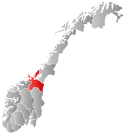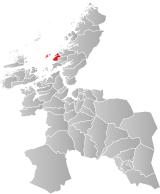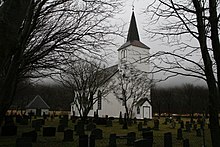Nes, Fosen
Nes Municipality
Nes herred | |
|---|---|
 Sør-Trøndelag within Norway | |
 Nes within Sør-Trøndelag | |
| Coordinates: 63°46′17″N 09°35′08″E / 63.77139°N 9.58556°E | |
| Country | Norway |
| County | Sør-Trøndelag |
| District | Fosen |
| Established | 1 Jan 1899 |
| • Preceded by | Bjugn Municipality |
| Disestablished | 1 Jan 1964 |
| • Succeeded by | Bjugn Municipality |
| Administrative centre | Nes |
| Area (upon dissolution) | |
| • Total | 60 km2 (20 sq mi) |
| Population (1964) | |
| • Total | 1,107 |
| • Density | 18/km2 (48/sq mi) |
| Demonyms | Nessar Nesser[1] |
| Time zone | UTC+01:00 (CET) |
| • Summer (DST) | UTC+02:00 (CEST) |
| ISO 3166 code | NO-1628[2] |
Nes is a former municipality in the old Sør-Trøndelag county, Norway. The municipality existed from 1899 until its dissolution in 1964. The 60-square-kilometre (23 sq mi) municipality encompassed the coastal land north of the Bjugnfjorden as well as the Tarva islands in what is now the municipality of Ørland in Trøndelag county. The administrative centre of Nes was the village of Nes where the Nes Church is located.[3]
History
[edit]
The municipality of Nes was established on 1 January 1899 when the old municipality of Bjugn was split into three separate municipalities: Bjugn (population: 1,256), Skjørn (population: 2,166), and Nes (population: 1,285). During the 1960s, there were many municipal mergers across Norway due to the work of the Schei Committee. On 1 January 1964, the municipality of Nes (population: 1,107) was merged with the neighboring municipalities of Bjugn (population: 1,240), Jøssund (population: 1,917), and the northern part of Stjørna (population: 676) to form a new, larger municipality of Bjugn.[4]
Government
[edit]All municipalities in Norway, including Nes, are responsible for primary education (through 10th grade), outpatient health services, senior citizen services, unemployment and other social services, zoning, economic development, and municipal roads. The municipality is governed by a municipal council of elected representatives, which in turn elects a mayor.[5]
Municipal council
[edit]The municipal council (Herredsstyre) of Nes was made up of representatives that were elected to four year terms. The party breakdown of the final municipal council was as follows:
| Party name (in Norwegian) | Number of representatives | |
|---|---|---|
| Labour Party (Arbeiderpartiet) | 5 | |
| Joint List(s) of Non-Socialist Parties (Borgerlige Felleslister) | 4 | |
| Local List(s) (Lokale lister) | 4 | |
| Total number of members: | 13 | |
| Party name (in Norwegian) | Number of representatives | |
|---|---|---|
| Labour Party (Arbeiderpartiet) | 6 | |
| Joint List(s) of Non-Socialist Parties (Borgerlige Felleslister) | 3 | |
| Local List(s) (Lokale lister) | 4 | |
| Total number of members: | 13 | |
| Party name (in Norwegian) | Number of representatives | |
|---|---|---|
| Labour Party (Arbeiderpartiet) | 4 | |
| Joint List(s) of Non-Socialist Parties (Borgerlige Felleslister) | 2 | |
| Local List(s) (Lokale lister) | 6 | |
| Total number of members: | 12 | |
| Party name (in Norwegian) | Number of representatives | |
|---|---|---|
| Labour Party (Arbeiderpartiet) | 4 | |
| Joint List(s) of Non-Socialist Parties (Borgerlige Felleslister) | 5 | |
| Local List(s) (Lokale lister) | 3 | |
| Total number of members: | 12 | |
| Party name (in Norwegian) | Number of representatives | |
|---|---|---|
| Labour Party (Arbeiderpartiet) | 6 | |
| Joint List(s) of Non-Socialist Parties (Borgerlige Felleslister) | 6 | |
| Total number of members: | 12 | |
| Party name (in Norwegian) | Number of representatives | |
|---|---|---|
| Labour Party (Arbeiderpartiet) | 6 | |
| Joint List(s) of Non-Socialist Parties (Borgerlige Felleslister) | 6 | |
| Total number of members: | 12 | |
| Note: Due to the German occupation of Norway during World War II, no elections were held for new municipal councils until after the war ended in 1945. | ||
See also
[edit]References
[edit]- ^ "Navn på steder og personer: Innbyggjarnamn" (in Norwegian). Språkrådet.
- ^ Bolstad, Erik; Thorsnæs, Geir, eds. (2023-01-26). "Kommunenummer". Store norske leksikon (in Norwegian). Kunnskapsforlaget.
- ^ Haugen, Morten, ed. (2009-02-14). "Nes – Sør-Trøndelag". Store norske leksikon (in Norwegian). Kunnskapsforlaget. Retrieved 2018-02-28.
- ^ Jukvam, Dag (1999). "Historisk oversikt over endringer i kommune- og fylkesinndelingen" (PDF) (in Norwegian). Statistisk sentralbyrå.
- ^ Hansen, Tore, ed. (2016-05-12). "kommunestyre". Store norske leksikon (in Norwegian). Kunnskapsforlaget. Retrieved 2020-02-02.
- ^ "Kommunevalgene og Ordførervalgene 1959" (PDF) (in Norwegian). Oslo: Statistisk sentralbyrå. 1960. Retrieved 2020-04-14.
- ^ "Kommunevalgene og Ordførervalgene 1955" (PDF) (in Norwegian). Oslo: Statistisk sentralbyrå. 1957. Retrieved 2020-04-14.
- ^ "Kommunevalgene og Ordførervalgene 1951" (PDF) (in Norwegian). Oslo: Statistisk sentralbyrå. 1952. Retrieved 2020-04-14.
- ^ "Kommunevalgene og Ordførervalgene 1947" (PDF) (in Norwegian). Oslo: Statistisk sentralbyrå. 1948. Retrieved 2020-04-14.
- ^ "Kommunevalgene og Ordførervalgene 1945" (PDF) (in Norwegian). Oslo: Statistisk sentralbyrå. 1947. Retrieved 2020-04-14.
- ^ "Kommunevalgene og Ordførervalgene 1937" (PDF) (in Norwegian). Oslo: Statistisk sentralbyrå. 1938. Retrieved 2020-04-14.

